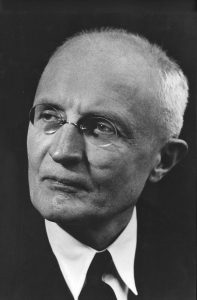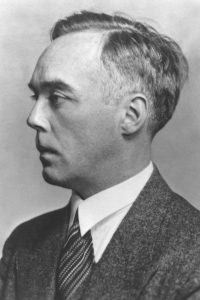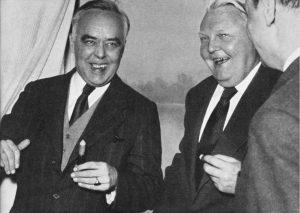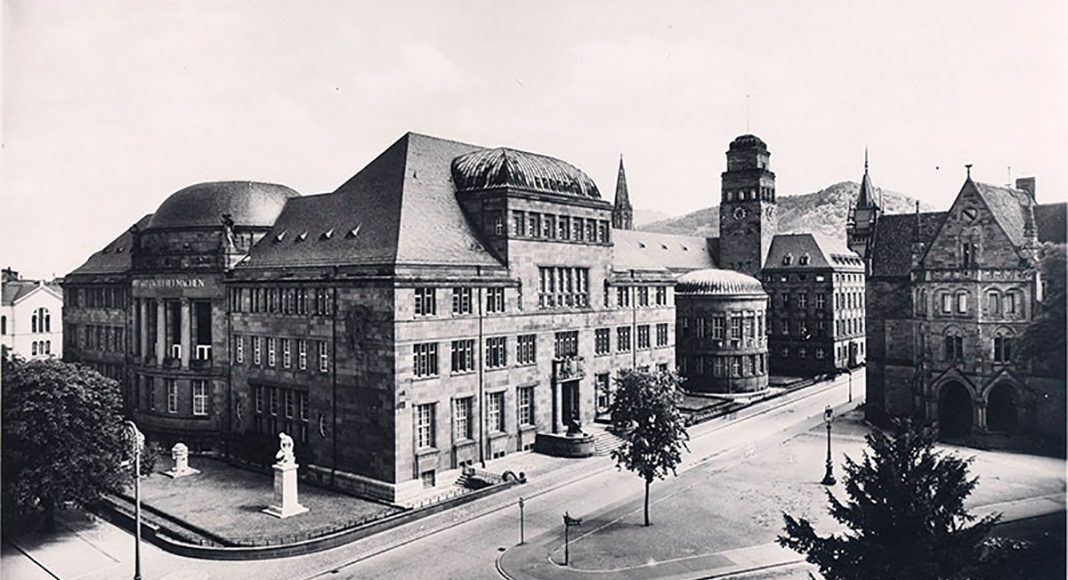The lesson from the quest of German ordoliberals for a privilege-free order from the 1930s to the 1950s is that once in motion, the refeudalization of society through the entanglement of private and state power is very difficult to reverse.
Editor’s note: The current debate in economics seems to lack a historical perspective. To try to address this deficiency, we decided to launch a Sunday column on ProMarket focusing on the historical dimension of economic ideas. You can read all of the pieces in the series here.
In April 1947, at the shores of Lake Geneva, young George Stigler and Milton Friedman attended the founding meeting of the Mont Pèlerin Society. The scholars who met in the Swiss idyll amid war-scarred Europe came together to diagnose the collapse of the liberal order since 1914, and to debate therapies for a more robust liberal order in the decades to come. Of all the experiences from their first trip to Europe, Stigler and Friedman recalled decades later in their memoirs the particularly strong impression which a German economist had made on them: Walter Eucken.
It was not only Eucken’s personality or his account of German totalitarianism that left this lasting imprint. In addition, striking scholarly parallels emerged at the meeting. Henry Simons, a formative teacher of Stigler and Friedman at the University of Chicago, had died in 1946, and so it was left to Aaron Director to present Simons’s politico-economic legacy at Mont Pèlerin. Director’s and Eucken’s papers were stunningly similar, in content and rhetoric. Both diagnosed the future of liberty to depend crucially on the systematic limitation of power in economy and society. For that purpose, the establishment and cultivation of a “competitive order” constituted the overarching goal both at Chicago and Freiburg.
In the early 1930s, Eucken and the lawyer Franz Böhm had founded the Freiburg School of ordoliberalism as a research community in law and economics. They understood society as a set of distinct but interdependent sub-orders, each of them with a different logic and purpose, and put the spotlight on the interface between the economic and the legal order. The ordoliberals conducted an explicitly normative search. They looked for orders which could fulfill a double criterion: enable material prosperity and, equally important, a humane life in liberty and justice. The archenemy they identified, in theory and their lives in a totalitarian state, was above all: power, of all varieties and in all combinations.

With respect to private economic power, the ordoliberals made a U-turn against a dominant intellectual tradition in German economics. During Germany’s first Great Depression, which persisted from 1873 to 1894, economists and lawyers had first foundational debates about cartels, understood as the umbrella term for collaborative monopolization of markets. A main culprit for the long crisis was identified in “excessive,” “ruinous” competition. According to the prevailing opinion, in their strife to gain market share companies systematically produced too much, entailing overproduction, too low prices and bankruptcies. Cartels came to be seen as an important stabilizer of business cycles. They were called “children of misery,” that is of economic instability, and the coordination among companies within the cartel should help against systematic overproduction and unnecessary bankruptcies.
This stance coincided with a truly consequential decision of the Imperial Court from February 4, 1897. The court proclaimed that cartel contracts were binding for its members. A company could not exit the cartel against the will of the other members, while the cartel was given the power to harm an outsider’s business. The number of cartels rose steadily before World War I, and the war made things even worse. The global economy took a serious blow and markets disintegrated, so national cartels became more dominant in these disintegrated markets. The number of cartels in Germany exploded from about 700 in 1914 to about 2,500 in 1930. Entire industries were organized in associations (Verband) that represented their special interests, both as cartels in the market and as lobbyists in politics. The Cartel Decree of 1923 targeted the abuse of power but did not ban cartels. Once the National Socialists seized power, they very soon passed the Compulsory Cartel Act and took full control of the existing cartel system.
The 1920s were the period when the ordoliberals gained their formative practical experiences in Berlin. Eucken, Böhm, and most of their associates and students worked for a while either in associations or in the ministerial bureaucracy. Observing the ever-deepening power entanglement between the state and special interests was a crucial impulse for the inception of ordoliberal political economy. Power as a problem and disempowerment as a procedure became the decisive challenge: not only as a scholarly, but also as a civic challenge. The ordoliberals engaged in resistance circles and drafted proposals for the future after National Socialism. In the last months of the war, members of the Freiburg circles were imprisoned and barely escaped their execution.
“Power is evil in itself”: Eucken endorsed this diagnosis of Swiss historian Jacob Burckhardt. And yet humans strive for power in all societal orders, often disguising their interests under an ideological cloak. While power in the hands of the state was assessed as the most dangerous, the ordoliberals did not ignore the potential of one’s fellow citizens to exercise detrimental influence on one’s choices. In market relations, power could be experienced in individual contracts, in the conditions in factories, in the calculation practices of companies and finally in the price formation within different market forms. The smaller the player, the smaller one’s power potential—thus the permanent skepticism about oligopolies and monopolies.

Along with the power of the state and the private power on the opposite side of the market, Eucken and Böhm classified “power collectives” of associations and the state as the third variety of power. Private power threatened the interests of the consumer and worker but also, due to its constant tendency to usurp political power, the interests of the citizen.
How to combat these power varieties and configurations? The ordoliberal concept of the competitive order contains insights on two levels: the economic and the political. In the economy, competition must be unleashed, following Böhm’s motto that “competition as the most ingenious disempowerment instrument in history.” All markets, including the labor market, should become as competitive as possible, entailing a maximum of choice options for the opposite side of the market. A set of constitutive and regulative principles are at the theoretical core of the competitive order. Open markets are a constitutive principle and a necessary, but not a sufficient condition in the battle against power—above all, markets in 1945 were as closed and fragmented as they had ever been since the 19th century, with little prospect of integration. So the regulative principle of establishing a competition authority as the guardian of a general cartel ban was added. Not abuse of power, but the very emergence of power configurations in the first place was the target.
Regarding natural monopolies, the ordoliberals struggled to identify the least-evil practice. Eucken maintained that they should stay private but be supervised by the competition authority. In sum, the competitive order should enable “performance-based competition” where it is the superior product and not anti-competitive behavior against one’s rivals which decide about success and failure.
In the political order, the goal was to find governance forms which would prohibit the 1920s from happening again, especially the fierce competition for rents by special interests. The key ordoliberal notion of policy is captured in the difficult-to-translate term “Ordnungspolitik,” which bases legislation as often as possible on general rules and as seldom as possible on privilege and discrimination. In this plea for a privilege-free order, Böhm warned of a “refeudalization of society” and compared rent-seeking with the feudal strife for privileges in earlier ages. The entanglement between the cartelized economy and the political order of the young Federal Republic of Germany had to be attacked.
After World War II, the Allies dismantled prominent cartels like I.G. Farben in the chemical industry, but it wasn’t until 1957/1958 that the Federal Republic implemented its antitrust legislation with the Act against Restraints on Competition. Böhm was one of its fathers, both as a scholar and as a member of parliament. However, the Act encountered a very powerful enemy: the Federation of German Industry (BDI) which, as the successor to the Reich Association of German Industry (RDI), did its utmost to protect the networks of the old cartel system. Despite the exemptions from general rules which such lobbyists smuggled into the final version, the Act became a main pillar of the postwar Social Market Economy personified and popularized by Ludwig Erhard, minister of the economy from 1949 to 1963 and Chancellor from 1963 to 1966. It also inspired the institutionalization of competition policy in the process of European integration.

During the 1940s, the competitive order was the focal point which united the intellectual efforts at Freiburg and Chicago. The notion was equally central for F. A. Hayek’s The Road to Serfdom (1944) and his contributions at Mont Pèlerin 1947. Yet during the postwar decades, the need to systematically foster competition lost some of its urgency. Global markets re-integrated, and their openness provided a substantial barrier to anti-competitive behavior.
In recent years, however, protectionism has threatened globalization’s open markets, while the economic properties of digital technologies have rendered market power even more topical. The lesson from the ordoliberal quest for a privilege-free order is that once in motion, the refeudalization of society through the entanglement of private and state power is very difficult to reverse. Above all, the ordoliberals were well aware that cultivating a culture of competition for better products, rather than competition for a better grip on the state, would remain a never-ending task for future generations.






